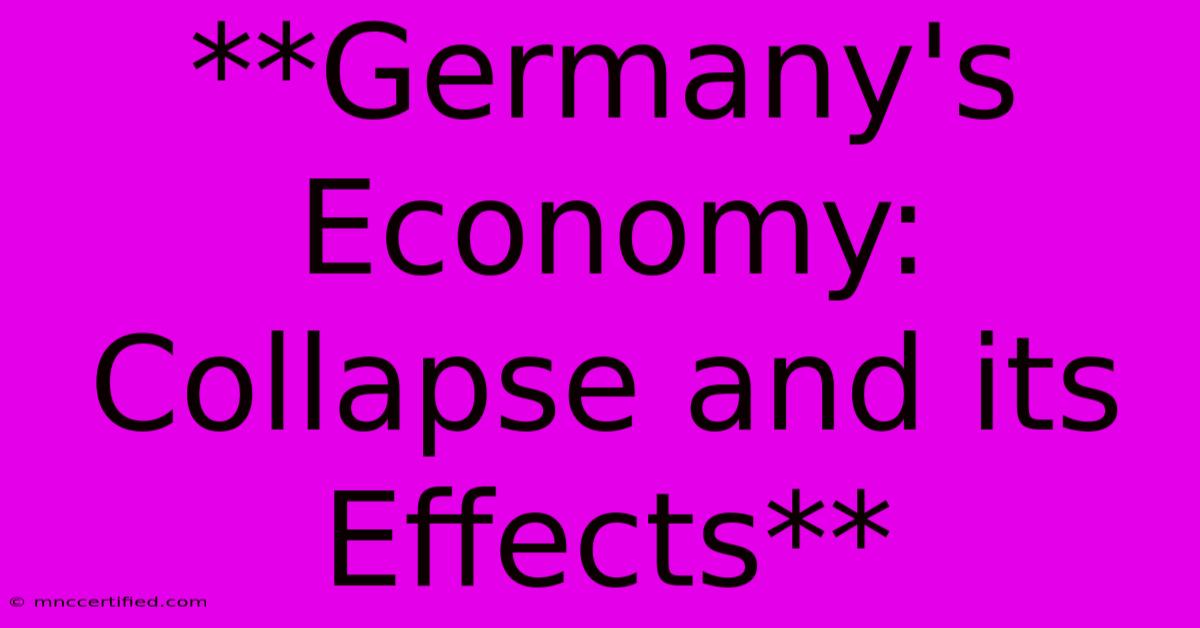**Germany's Economy: Collapse And Its Effects**

Table of Contents
Germany's Economy: A Look at the Challenges and Potential Collapse
Germany, known for its strong economic performance and stability, is facing a period of uncertainty and potential economic decline. While the country has historically weathered many storms, recent events and trends suggest a challenging future. This article will delve into the potential causes of an economic collapse in Germany, examining the factors contributing to this concern and analyzing its potential effects on the country and the wider European Union.
The Warning Signs: Cracks in the German Economic Fortress
Several factors are contributing to the perception of an impending economic collapse in Germany:
1. Energy Crisis: The war in Ukraine and the subsequent energy crisis have dealt a heavy blow to the German economy. Russia, a major supplier of natural gas to Germany, has significantly reduced its exports, causing energy prices to skyrocket. This has increased costs for businesses and consumers, impacting their spending power and overall economic growth.
2. Inflation: The energy crisis has fueled inflation in Germany, eroding purchasing power and reducing consumer confidence. The high inflation rate is a significant economic burden, impacting businesses and individuals alike.
3. Dependence on Exports: Germany's economic success has been built on its strong manufacturing and export sectors. However, rising energy costs, global supply chain disruptions, and weakening demand in key markets like China have hurt exports, putting pressure on these sectors.
4. Aging Population: Germany faces a demographic challenge with a rapidly aging population. This leads to a shrinking workforce, putting strain on social security systems and limiting economic growth potential.
5. Political Instability: The recent political turmoil in Germany, including the change in government and internal political disagreements, adds to the sense of uncertainty and can impact investor confidence and economic decision-making.
Potential Effects of a German Economic Collapse
A collapse of the German economy would have far-reaching consequences, impacting not only Germany but also the wider European Union:
1. European Economic Downturn: Germany is the largest economy in the Eurozone and a significant contributor to the EU's overall economic performance. A German economic collapse would likely trigger a recession in the EU, creating ripple effects across member states.
2. Financial Instability: A weakening German economy could lead to financial instability, potentially impacting the stability of the Eurozone and the overall European banking system.
3. Social Unrest: A major economic downturn in Germany could lead to social unrest and political instability, as citizens grapple with job losses, rising prices, and a diminished standard of living.
4. Global Impact: Germany's role in the global economy means that its economic woes would have a significant impact on global trade and investment.
Can Germany Avoid Collapse?
Despite the challenges, Germany has a strong track record of economic resilience. The government has implemented measures to address the energy crisis and inflation, such as providing financial support to businesses and individuals. However, the long-term impact of these measures remains to be seen.
Germany needs to focus on diversifying its energy sources, strengthening its domestic economy, and promoting innovation to remain competitive in the global market. The government also needs to address the demographic challenges and create policies that encourage investment and growth.
Looking Ahead:
While the immediate future looks challenging, Germany has the resources and expertise to navigate the current economic difficulties. However, proactive measures and strategic decision-making are crucial for maintaining its economic strength and preventing a potential collapse.
Keywords: German economy, economic collapse, energy crisis, inflation, exports, aging population, political instability, European Union, Eurozone, financial instability, social unrest, global impact, economic resilience, innovation, investment, growth.

Thank you for visiting our website wich cover about **Germany's Economy: Collapse And Its Effects**. We hope the information provided has been useful to you. Feel free to contact us if you have any questions or need further assistance. See you next time and dont miss to bookmark.
Featured Posts
-
Does A F550 Require Commercial Insurance
Nov 08, 2024
-
Job Description Of Insurance Coordinator
Nov 08, 2024
-
Nuggets Fans Witness Westbrooks Style Early On
Nov 08, 2024
-
Health Insurance Paid Time Off Crossword
Nov 08, 2024
-
Report North Korean Troops Consuming Porn In Russia
Nov 08, 2024